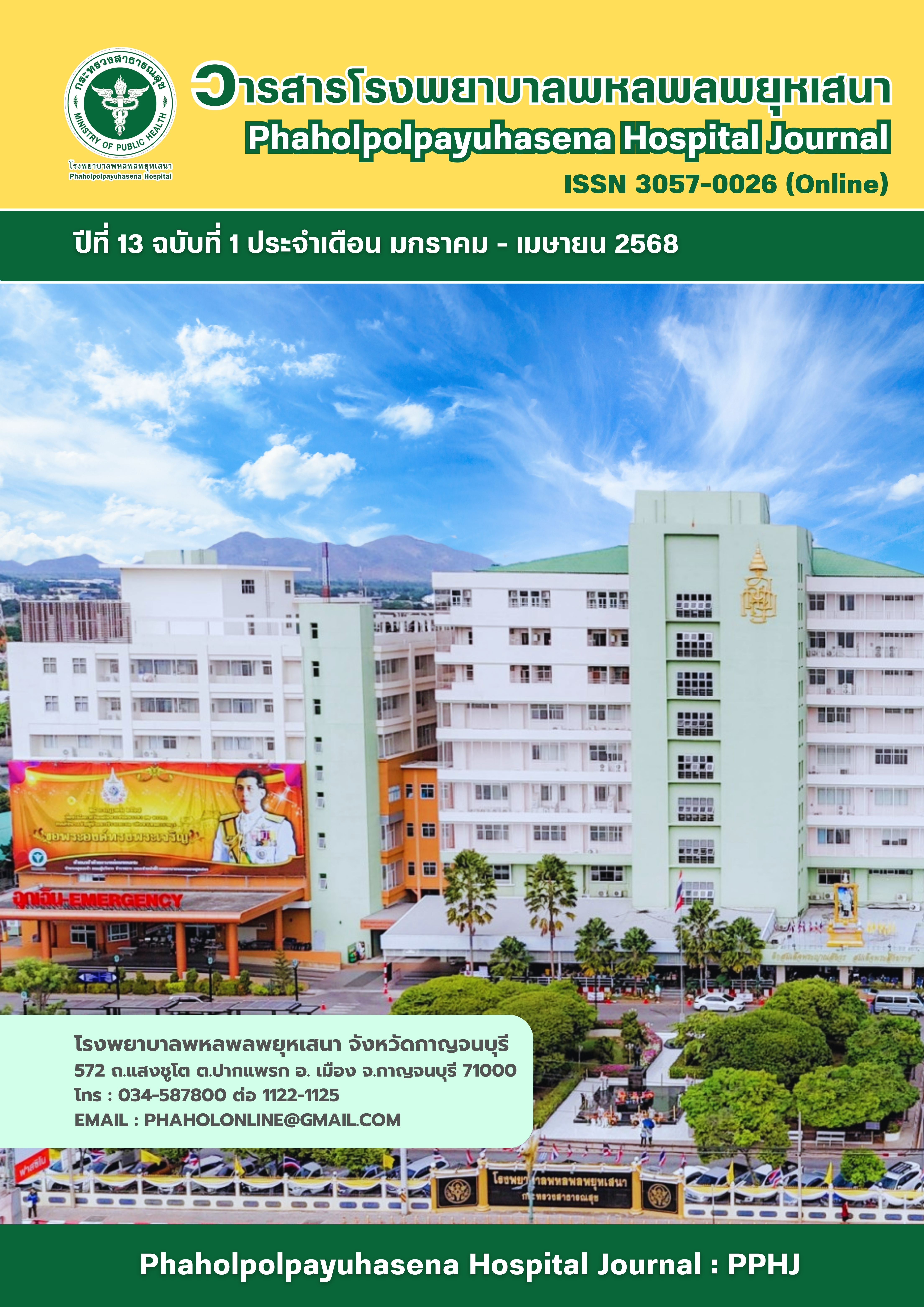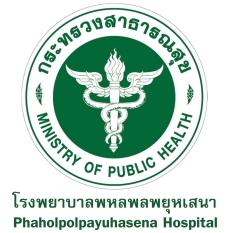Effectiveness of a Methylphenidate Adherence Promotion Program for Caregivers of Children with Attention Deficit Hyperactivity Disorder (ADHD) at Krathum Baen Hospital, Samut Sakhon
Keywords:
adherence promotion program, Attention Deficit Hyperactivity Disorder, methylphenidateAbstract
Objectives: to study the effectiveness of a Methylphenidate Adherence Promotion Program for Caregivers of Children with Attention Deficit Hyperactivity Disorder (ADHD) at Krathum Baen Hospital, Samut Sakhon
Methods: A quasi-experimental, two-group pretest-posttest design was conducted. The sample consisted of parents of children with ADHD who received services at a child and adolescent psychiatry clinic, Krathum Baen Hospital, between June and July 2024. Sixty participants were purposively selected and assigned to either the experimental group (n=30) or the control group (n=30). Data were collected using a questionnaire assessing knowledge and adherence to medication use, which had a reliability coefficient of 0.95. Data were analyzed using descriptive statistics and t-tests.
Results: Post-intervention, the experimental group demonstrated a statistically significant increase in the mean score of knowledge regarding ADHD and methylphenidate use compared to the pre-intervention score (7.96±1.03 vs. 4.63±0.86; p<0.001), and a statistically significant higher mean score than the control group (p<0.001). Furthermore, the experimental group showed a statistically significant increase in the consistency of administering methylphenidate to their children compared to the pre-intervention level (85.46±5.59 vs. 76.38±4.36; p<0.001), and a statistically significant higher mean score than the control group (p<0.001).
Conclusions: The medication adherence promotion program for methylphenidate in parents of children with ADHD was effective in improving their knowledge and consistency in administering the medication by focusing on ensuring that parents have accurate knowledge and understanding regarding medication use, as well as supporting appropriate and continuous medication administration behaviors.
References
Krain AL, Castellanos FX. Brain development and ADHD. Clin Psychol Rev. 2006;26(4):433-44.
ปัจฉิมา หลอมประโคน. ปัจจัยที่มีความสัมพันธ์กับผลการรักษาสมาธิสั้นในเด็ก. วารสารการแพทย์โรงพยาบาลศรีษะเกษม สุรินทาร์ บุรีรัมย์. 2565;37(2):381-90.
สถาบันราชานุกูล กรมสุขภาพจิต. สมาธิสั้น [อินเทอร์เน็ต]. 2556 [เข้าถึงเมื่อ 2 ม.ค. 2568]. เข้าถึงได้จาก: https://th.rajanukul.go.th/_admin/file-download/groupreview0000268.pdf
ระบบคลังข้อมูลด้านการแพทย์และสุขภาพ. ผู้ป่วยโรคสมาธิสั้นเข้าถึงบริการ (workload) [อินเทอร์เน็ต]. 2566 [เข้าถึงเมื่อ 2 ม.ค. 2568]. เข้าถึงได้จาก: https://hdc.moph.go.th/spk/public/standard-report-detail/90ccfbfd92f7d1bdd89d0cfd8b4e46ec
วิฐารณ บุญสิทธิ. โรคสมาธิสั้น: การวินิจฉัยและการรักษา. วารสารสมาคมจิตแพทย์แห่งประเทศไทย. 2555;57(4):373-86.
จินิส สีห์รา, วัลลภ อัจสริยะสิงห์, ชุติมา แจ้งจิตร, ชาญวิทย์ พรนภดล. การศึกษานำร่องเรื่องประสิทธิผลของกิจกรรมกลุ่มผู้ปกครองเพื่อลดอัตราการรับประทานยาไม่สม่ำเสมอในผู้ป่วยโรคสมาธิสั้น. วารสารสมาคมจิตแพทย์แห่งประเทศไทย. 2562:64(1):3-20.
ชาญวิทย์ พรนภดล. คู่มือวิทยากรการฝึกอบรมผู้ปกครองวิธีปรับเปลี่ยนพฤติกรรมเด็ก. นครปฐม: คณะแพทยศาสตร์ศิริราชพยาบาล ม.มหิดล; 2548.
ชมรมผู้ปกครองบุคคลสมาธิสั้นแห่งประเทศไทย. การใช้ยาและผลของยา. [ม.ป.ป] [เข้าถึงเมื่อ 19 เม.ย. 2568]. เข้าถึงได้จาก: http://www.adhdthai.com/autistic/catalog.php?category=17
พาสินี แจ่มจ้า, สุนิศา สุขตระกูล, ประนอม รอดคำดี. ผลของโปรแกรมการจัดการความเครียดต่อความสามารถในการดูแลของผู้ดูแลเด็กสมาธิสั้น. วารสารแพทย์นาวี. 2562;46(1):32-48.
อธิชาดา อธิพงษ์อาภรณ์, นิดา ลิ้มสุวรรณ. สาเหตุของการขาดการติดตามการรักษาอย่างต่อเนื่องในผู้ป่วยโรคสมาธิสั้น วัยเด็กและวัยรุ่น. วารสารสมาคมจิตแพทย์แห่งประเทศไทย. 2561;63(1):33-46.
กรรณิกา ไถนาเพรียว, อรวรรณ หนูแก้ว, วีณา คันฉ้อง. ปัจจัยทำนายพฤติกรรมการดูแลของผู้ดูแล ด้านการรับประทานยาต่อเนื่องของเด็กสมาธิสั้นวัยเรียน. วารสารมหาวิทยาลัยคริสเตียน. 2565;28(3):72-86.
Rosenstock M, Strecher J, Becker H. Social learning theory and the health belief model. Health Educ Q. 1988;15(2):175-83.
Morisky DE, Green LW, Levine DM. Concurrent and predictive validity of a self-reported measure of medication adherence. Med Care. 1986;24(1):67-74.
Bloom BS. Taxonomy of Education Objectives: The Classification of Education Goal. New York: Longman; 1956.
ปัณม์ชรัก เฟื่องโพธิ์ทอง. โปรแกรมการบริบาลยาเภสัชกรรมส่งเสริมความต่อเนื่องในการรับประทานยาต้านไวรัสเอดส์ในผู้ป่วยที่ไม่ร่วมมือในการใช้ยา. วารสารวิชาการสาธารณสุข. 2560;26(1):185-97.
Cohen J. Statistical Power Analysis. Psychol Sci. 1988;1(3):98–101
วันรวี พิมพ์รัตน์. ความสัมพันธ์ระหว่างความรู้และทัศนคติของผู้ปกครองกับความสม่ำเสมอในการกินยา methylphenidate ของเด็กสมาธิสั้น. วารสารสมาคมจิตแพทย์แห่งประเทศไทย. 2566;61(1):15-26.
Safavi P, Saberzadeh M, Tehrani AM. Factors associated with treatment adherence in children with attention deficit hyperactivity disorder. Indian J Psychol Med. 2019;41(3):252-7.
Downloads
Published
How to Cite
Issue
Section
License
Copyright (c) 2025 Phaholpolpayuhasena Hospital

This work is licensed under a Creative Commons Attribution-NonCommercial-NoDerivatives 4.0 International License.
บทความที่ได้รับการตีพิมพ์เป็นลิขสิทธิ์ของโรงพยาบาลพหลพลพยุหเสนา
ข้อความที่ปรากฏในบทความแต่ละเรื่องในวารสารวิชาการเล่มนี้เป็นความคิดเห็นส่วนตัวของผู้เขียนแต่ละท่านไม่เกี่ยวข้องกับโรงพยาบาลพหลพลพยุหเสนาและบุคลากรท่านอื่น ๆ ในโรงพยาบาลฯ แต่อย่างใด ความรับผิดชอบองค์ประกอบทั้งหมดของบทความแต่ละเรื่องเป็นของผู้เขียนแต่ละท่าน หากมีความผิดพลาดใด ๆ ผู้เขียนแต่ละท่านจะรับผิดชอบบทความของตนเอง



 Phaholpolpayuhasena Hospital
Phaholpolpayuhasena Hospital
